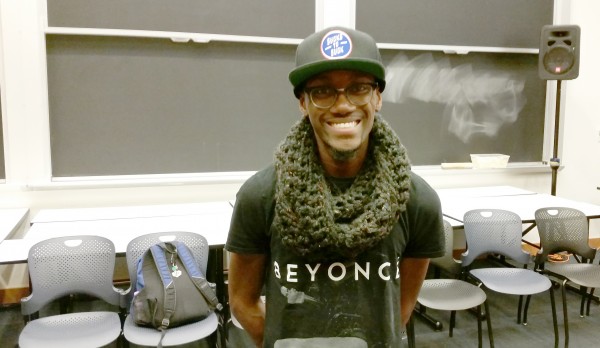
As we wait for the St. Louis county grand jury to reach a decision on whether or not to indict Officer Wilson in the killing of Michael Brown, ACLU national staff is in Ferguson, Missouri, to support the work of the ACLU of Missouri and to share the stories of who have been on the ground since August.
Larry Fellows III, a 29-year-old accidental organizer from St. Louis City, talks to the ACLU about his experience organizing in Ferguson in the wake of Michael Brown’s killing.
How did you get into organizing in the aftermath of the Ferguson tragedy?
The Sunday after Mike was killed, I met friends and went to the memorial. Later that night, we were supposed to go to the vigil. My friend lives a block away from where it happened, so we parked at his house an hour and a half before the vigil. We didn’t make it to the vigil.
When we arrived there, the police were blocking off the streets. There were guard dogs. They already had riot gear. For them to block off a major street was crazy.
Did that surprise you?
Oh yeah. That is not a common thing in this area for police brigades. They made things very uneasy, not just for me, but for everybody. I checked in with my friend, and was like, “Is everything okay?” He said, “Yeah, we’re at the vigil.” Then your mind starts going in a different space. Like, what are they really preparing for? They know we’re angry. They know we’re upset. They know we have a legitimate reason to be uneasy right now. They didn’t seem to understand that people are mourning here.
Had you seen yourself as an activist before?
No, never. It wasn’t until the next day I went to a protest. That was the first being shot at with rubber bullets and having M-16s aimed at me, and seeing armored vehicles, and being teargased, with, like, these weird Pokémon balls that spit out gas. All this stuff I had never seen before in my life.
It just showed me we should be able to fight for our constitutional rights without being terrorized by the police. That’s initially when I became upset and angry with everything that was going on.
How did you start organizing?
Initially, it would just be that we would show up for protests, and the next day we’d clean up the streets. A lot of the same people were out at the protests and going out to lunch and talking about what was happening. That became a cycle until a lot of us figured out we needed to have a strategy. The police would come with different tactics every day, so we needed to figure out other tactics of how to protest. Then a lot of organizers from across the country started to come in to help us do the planning and do the strategizing. That helped us start doing it on our own, and planning out actions and what our narratives were going to be. Our meetings and actions are geared toward getting something accomplished.
What are your fears or hopes of what is going to happen when the grand jury decision comes down?
My main focus has always been our safety. The safety of the protesters; the safety of the residents in St. Louis County. The fact that we are being painted as violent, but when you look at photos: Who’s been showing up with gear? Who’s been showing up with weapons? It’s been the police.
One thing the ACLU has focused on is how the militarization of police has a disparate impact on communities of color. Is that something you feel in your personal experience?
Most definitely. It’s sad we have to look at it that way. A bunch of black people unified — people automatically think something violent is going to happen. Why would you assume that? When groups of white people do show up and are rioting the same tactics aren’t used. Look at Look at any NHL championship game.
If anything good can come of this tragedy, what do you hope it will be?
I think something good has already come of it. I’ve definitely built relationships and friendships with so many different people I hadn’t crossed paths with before, or if I did, we hadn’t noticed each other.
And it’s definitely opened our eyes to what is going on in St. Louis. There’s been this thing for years that hasn't been blatant racism. Since August, l’ve seen black people, including myself, be called ugly names. I’ve seen people spit on. It’s made people more open to be racist. So having to have these conversations about race, it’s definitely happening way more often now.
Learn more about racial justice and other civil liberty issues: Sign up for breaking news alerts, , and .
